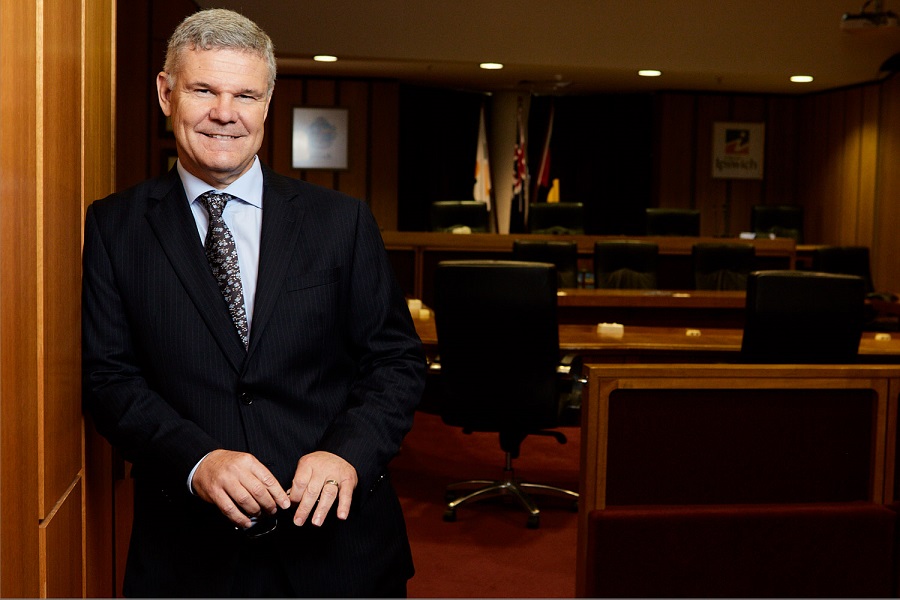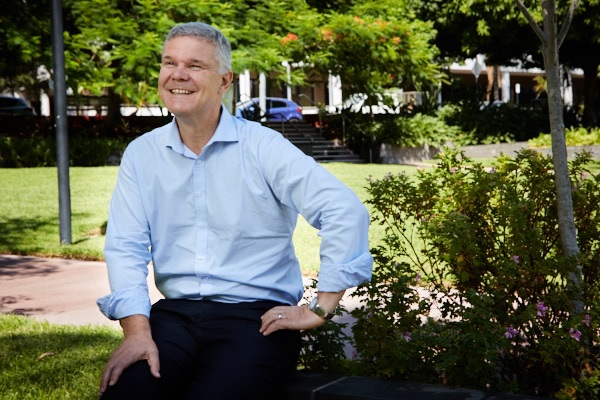There’s a personality player in most good school rugby league teams, often a big guy who to the cheers of the crowd breaks the line and sets up scoring opportunities for his mates.
He’s also the guy who’s happy to take a few hits, to set an example, to ensure those around him are as committed to the cause as he is.
As a teenager, self-confessed “bogan from Wollongong” and now Ipswich City Council CEO David Farmer was that guy. Sort of.
“I was the fat guy with the big hit or the clever pass. Then I’d have a little rest,” he says.
He still is the impact player, particularly if the analogy is a willingness to take on responsibility, looking adversity in the eye, and doing what it takes to win.
The hospital pass
In his professional life, Mr Farmer has taken on some big challenges. To continue the football metaphor, he’s taken what others might have seen as a hospital pass and turned it into a scoring opportunity.
As a 19-year-old accounting cadet, he pioneered the introduction of electronic spreadsheets for the equivalent of the local electricity board, an organisation which at the time was paying for his university.
“I come from a frugal upbringing,” he recalls.
“My dad was a manager in a large factory, he was involved in rugby league, and we had greyhounds in our backyard. I remember a time when I got to try Sustagen. Just once though, because dad had gotten a hold of some, and it was for the dogs.
“He was a successful man. He was reasonably high up the food chain at work for a tradesman, and the dogs held all sorts of track records around the place.”
Like his father, Mr Farmer – the junior version – also delighted in success. At school, he was among a group of high achievers. Some have gone on to manage high-end financial institutions. Others have done well in other areas.
The electronic spreadsheets, a 1980s corporate version of Excel, gave Mr Farmer and the team around him an opportunity to point out the value of public electricity assets which amounted to billions of dollars.
It resulted in asset sales which has funded new infrastructure like rail lines and roads in NSW.
“There were thousands of sets of fingers in it over 40 years, but I was pleased to be at the front end of it all,” Mr Farmer says.
A move to councils
He moved to Wollongong City Council where a couple of years managing budgets led to the perfect role to set up a corporate planning division. He became the corporate planner.
The skillset transferred to Cairns City Council, where he was strategic planner in the mid-1990s. The big win during that time, was raising enough money from the community to turn the city’s old courthouse into a public art gallery.
He sat through a merger of Cairns and Mulgrave councils, before taking a holiday and a punt. The holiday was a backpacking tour of Europe for three months. The punt was with a group of mates who wanted to make it rich in the wealth management game.
“They ended up making millions, but I wasn’t patient enough to wait,” he says.
Instead, he took a role as deputy CEO at Mudgee Council, a country area noted for its coal mining, good wine, hobby farms and tourism.
The boss moved on, and Mr Farmer found himself at the helm. That was, until he moved back to Cairns where he worked with Kevin Byrne, a strong-willed mayor and well-known businessman.
It was a period of considerable change for the tourism mecca.
Mr Farmer has three boys, aged 16, 19 and 21, “a couple bigger than me”. Back then, they were the ideal inspiration for a world-class playground which was built along the Cairns Esplanade.
The redevelopment of the foreshore featured a massive lagoon, not dissimilar to Ipswich’s own Orion Lagoon.
Like the art gallery project 10 years earlier, the people of the city embraced the project. Council staff volunteered time to show others around, and tourists had yet another reason to visit the gateway to the Great Barrier Reef.
Almost too close to home
Mr Farmer was in the far north from 2000-2007, until his hometown came calling.
The Independent Commission Against Corruption (ICAC) had launched an inquiry, later dubbed by the media as a “sex-for-development scandal” which resulted in 11 arrests and more than 100 charges.
Sex and money were being used as bribes. The city was broke, and administrators were wheeled in to replace a sacked council.
Sound familiar?
“Ipswich is a little bit different. It’s been a slow drip of arrests, charges, and now some convictions,” he said.
“Wollongong was my home town, so you have roots which dig deep into the community, and you have a spiderweb of connections, which means you feel you own the issues.
“Also, I was in my mid-40s, in the prime of my career. I had a bit more to lose, and I really wasn’t sure what to do. This stuff was unprecedented. The staff were devastated. It was 16 pages every day in the local newspaper.
“But you have to keep your head, stay confident, and remain calm. You slowly build a team around you and work out how to save money and rebuild the place.”
Returning the council to elected representatives after three years of administration remains one of Mr Farmer’s proudest achievements.
The Ipswich challenge
Now, in Ipswich, anybody might be forgiven for thinking Mr Farmer is a glutton for punishment. But he doesn’t see it that way.
“I wanted a substantial, meaningful role that I knew might be difficult,” he says.
Improvements will become evident in a series of governance systems and processes that show Ipswich City Council is at a better level, he says.
On weekends, Mr Farmer can be seen zipping around the inner suburbs of Brisbane on his Vespa, taking time out to read a good book or cheer on his beloved St George-Illawarra Dragons.
During the week, it’s back to the challenge of turning the operations of a council around.
How long will it take?
“I don’t know,” he says. “Three months, four months, five months. I’d like to see some real progress, then you start to build momentum.”
However long, he says he’s in for the long haul.



